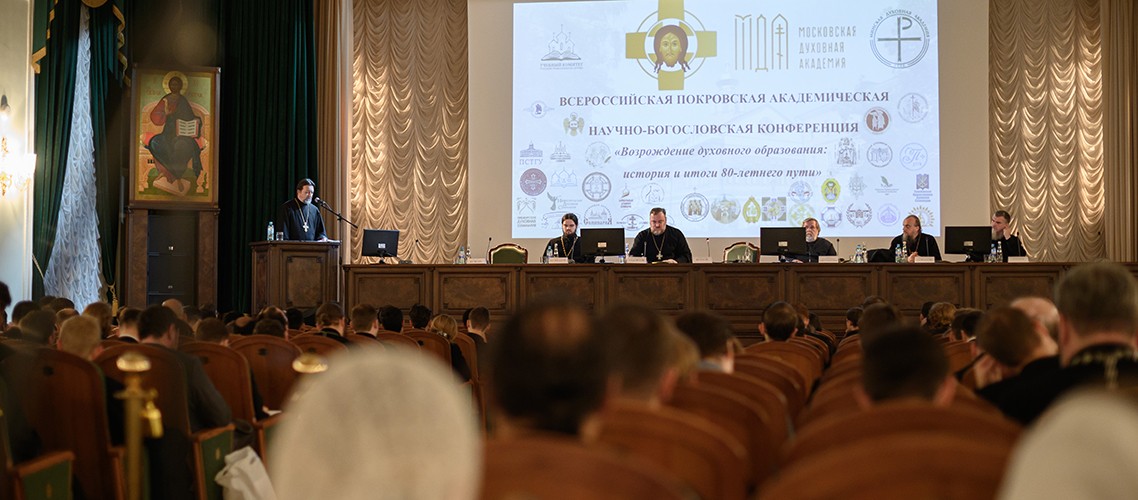
The annual Intercession Scientific Conference took place at the Moscow Theological Academy
On October 11, 2024, on the eve of the Intercession of the Mother of God, the Moscow Theological Academy hosted an annual scientific conference dedicated to the history and the revival of theological education in Russia.
Archpriest Maxim Kozlov, Chairman of the Educational Committee of the Russian Orthodox Church, Rector of the All-Church Postgraduate and Doctoral Studies names after St. Cyril and Methodius, honorary Doctor of the Moscow Theological Academy, opened a plenary session. His report covered first years of the formation of theological schools after their revival in 1944 and the difficulties that teachers and students faced in those years.
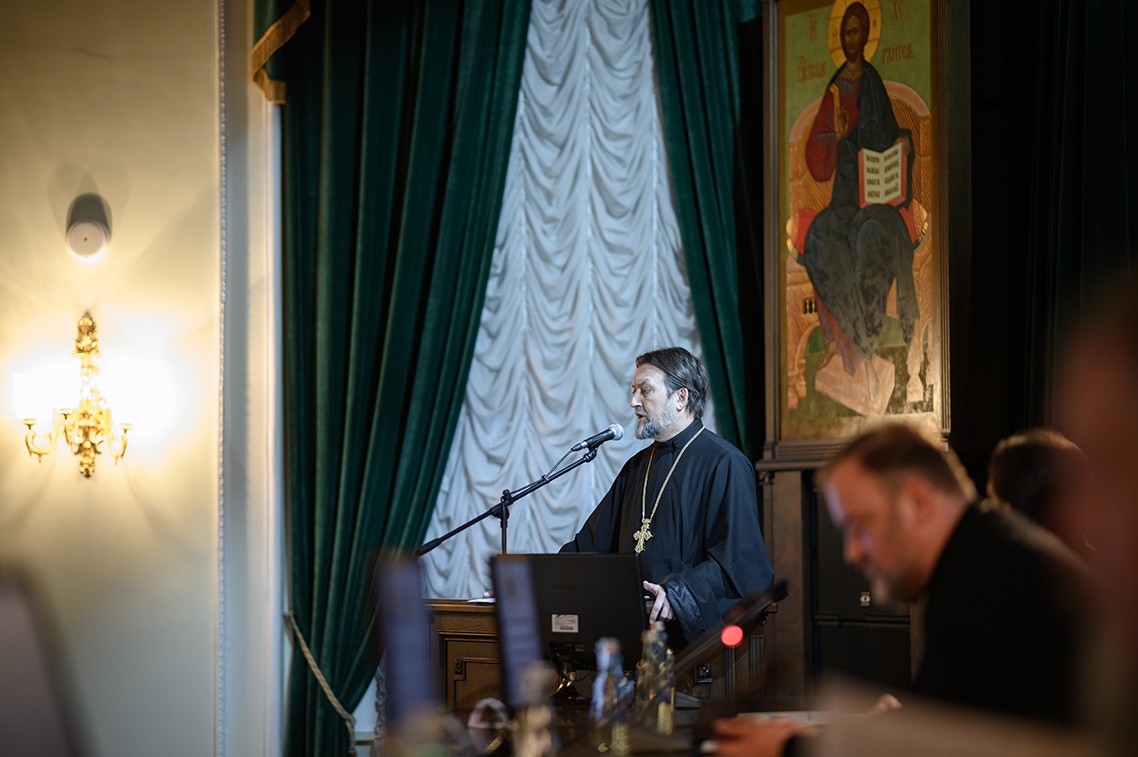
Various aspects of this topic were discussed by other participants such as Professor A.K. Svetozarsky, Head of the Church History Department of the Moscow Academy of Sciences, and Associate Professor priest John Kechkin. Archimandrite Aphanasiy (Sokolov), Rector of the Minsk Theological Academy, spoke about the creation and current situation at the Minsk theological school and its traditions. Priest Nikita Kuznetsov, Rector of the Kazan Theological Seminary, spoke about church-state relations as an important factor for the higher theological education now and then. The report of a senior teacher of the Department of church-practical disciplines of the Moscow Theological Academy O.A. Sukhanov caused a particular interest touching upon teaching and educational components in spiritual education today.

After lunch, separate sections took place.
Theological section formed reports made by teachers from the Moscow Theological Academy, Kazan and Don Theological Seminaries, as well as students and graduates of the St. Philaret’s Institute. They covered a wide range of topics dedicated to both Russian religious thoughts of the XX century, Russian patristic heritage, Western modern Protestant and Catholic Theology.
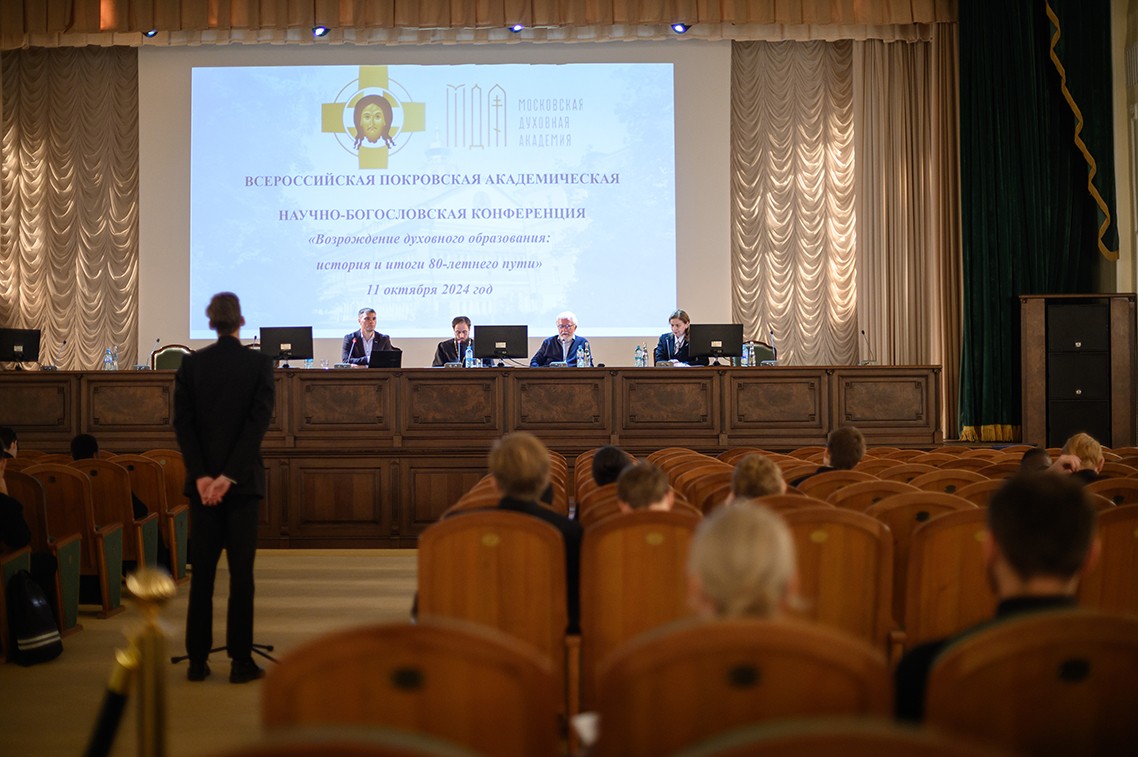
At the section of “Patrology and Christian Literature”, teachers from the MThA, PSTGU and SFI made reports on Greek and Latin patristics. Despite the large geographical and chronological gap, the reports correlated with each other. They were dedicated to literary connections between East and West in the patristic era and served as a link between two main thematic blocks of the section.

At the section “History and Development of Theological Schools of the Russian Orthodox Church,” reports were made by teachers, staff and students of the Moscow Theological Academy, Russian Orthodox University by St. John the Theologian, All-Church Postgraduate and Doctoral Studies named after. St. Cyril and Methodius, Minsk, Voronezh, Yekaterinburg and Orenburg theological seminaries. The main topic was spiritual education in the XX century on the example of the history of the Moscow Theological Academy and provincial theological educational institutions.
The section discussed current issues of Church History touched upon the unity of the Orthodox Churches due to the position of the Constantinople Patriarchate. In addition, there were some commentaries on the Russian Church in the synodal and Soviet periods relating to the liturgical life, the practice of venerating the remains of the emperor, the life of theological schools, etc.
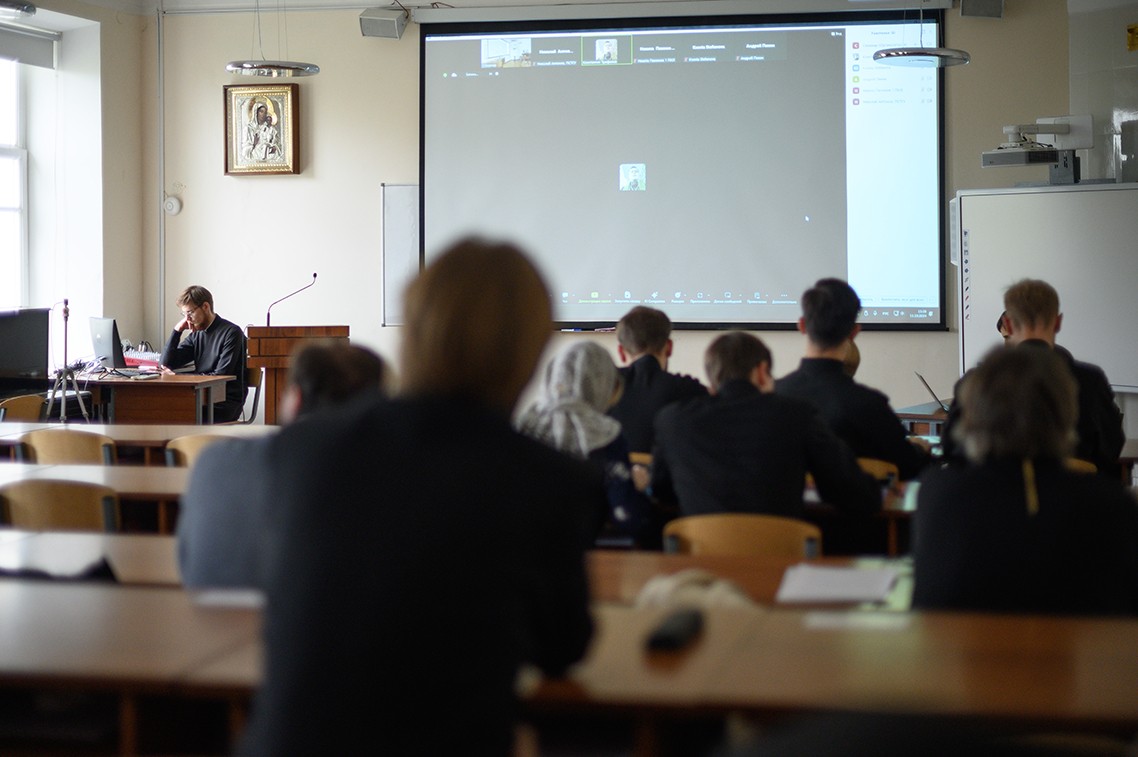
The “Church History” section featured important research on various aspects of the Church’s past. Priest Ilya Solovyov, PhD of Historical Sciences, PhD of Theology and Associate Professor of the Church History Department of the All-Church Postgraduate and Doctoral Studies named after. St. Cyril and Methodius, highlighted the topic of theological education in the context of the renovationist schism. Mikhail Afanasyev, a graduate student at the Moscow Theological Academy, presented the view of the renovationist Metropolitan Alexander Vvedensky on the relationship between the Church and the state. Dmitry Gorstka, a graduate student at the Moscow Theological Academy, examined the current problems of spiritual education of Orthodox communities in China. Aphanasiy Zoitakis, PhD of Historical Sciences and Associate Professor of the Department of Church History of the Moscow Theological Academy, shared research on the missionary activities of Orthodox brotherhoods in the Balkans in the first half of the XX century. Efim Ognev, a second-year Master's student at the Moscow Theological Academy, analyzed the contribution of the Exarch of the Bulgarian Metropolitan Joseph (Yovchev) to the development of Bulgarian education in 1878-1915.

The “Christian Writing” section featured reports on diverse areas of philological science like the study of texts of the Christian tradition, the philosophical and ethical aspects of Russian writers, the formation of their religious views, and current issues in the study of the language of liturgical texts.
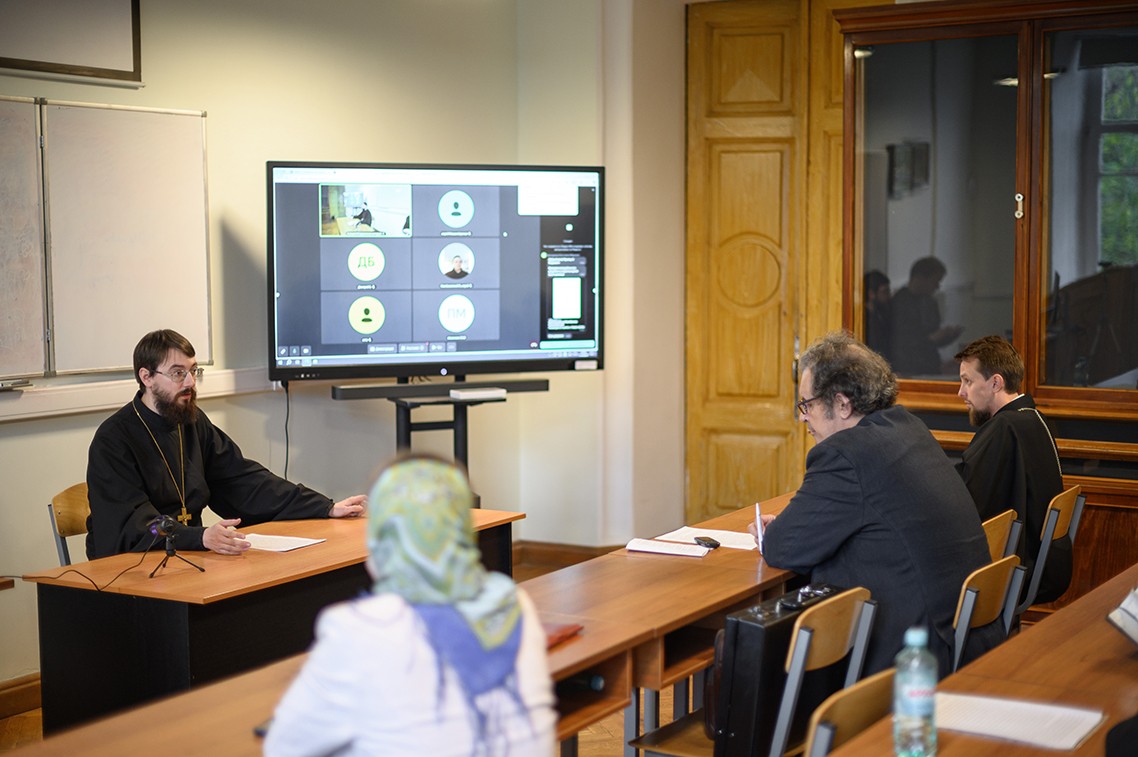
The “Liturgics” section covered topics of historical and practical liturgics, several aspects of the history of private prayer in the tradition of the Russian Orthodox Church, history of the liturgics study in Russian science, as well as the problems of the development of liturgical singing in the parishes of the Russian diaspora.

The section “Exegesis and Hermeneutics of the Holy Scriptures in the Light of Orthodox Tradition” was conducted by the Department of Biblical Studies of the Moscow Theological Academy. The topics of the reports reflected the results of research in the fields of biblical theology, exegesis of the Epistles of St. Paul, exegesis of the Old Testament, patristic exegesis, biblical archeology, and biblical hermeneutics. Most of the reports aroused active discussion.

Seven reports were presented at the “Church Art” section discussed the existence of professional art history terms in the world and the monastery; contemporary church art of the West and methods of teaching its history based on the experience of compiling a curriculum for a continuing education program for icon painters; church education before the emergence of the Slavic-Greek-Latin Academy; technological techniques used by ancient Russian craftsmen in works of church art, studied based on materials from chronicles and written sources; established approaches to the study of catacomb paintings; iconography of saints and teachers of the Church in the painting of the Church of the Virgin Mary Perivelept in Ohrid; written sources about the construction and decoration of the Trinity Cathedral of the Holy Trinity St. Sergius Lavra.

At the “Canon Law” section, lecturers from the Department of Church-Practical Disciplines of the Moscow Theological Academy, students of the Master’s program “Modern Canon Law”, as well as guests of the Academy took place.
The following reports were made at the section:
• “Celibacy of the priesthood in the history and modern Russian Orthodox Church”, Archpriest Vladislav Tsypin, Professor of the Department of Church-Practical disciplines of the Moscow Theological Academy;
• “Apology for the ban on second marriage for clergy in the Orthodox Church”, Roman Alekseev, a fourth-year undergraduate student at the Moscow Theological Academy;
• “Comparative analysis of the provisions of modern church and secular legislation on the conditions and forms of marriage. Possibilities for recognizing the norms of church marriage in secular law”, Priest Pavel Bibin, clergyman of the Holy Trinity Church in Arkhangelsk, Master’s of Theology and Law;
• “Legal initiatives to ban abortion in the Russian Federation”, Mikhail Lvov, a first-year Master’s student at the Moscow Theological Academy;
• “Legal support for the implementation of the system of traditional Russian spiritual and moral values in the light of the special role of Orthodoxy”, N.S. Semenova, Associate Professor of the Department of Church-Practical disciplines of the Moscow Theological Academy, acting. Head of the Department of Church History and Church Law of the All-Church Postgraduate and Doctoral Studies named after. St. Cyril and Methodius, Associate Professor of the Department of Church-Practical Disciplines of the Tula Theological Seminary;
• “Legal regulation of cultural policy of the Russian Federation and issues of implementation of relevant norms”, Ivan Tuev, a first-year Master’s student at the Moscow Theological Academy;
• “Legal status of the military clergy of the Russian Orthodox Church in the Russian Federation: main challenges”, Daniil Gashchuk, a first-year Master’s student at the Moscow Theological Academy;
• “Legal status of the Russian spiritual mission in Jerusalem during the British Mandate”, Daniil Mayev, a first-year Master’s student at the Moscow Theological Academy.
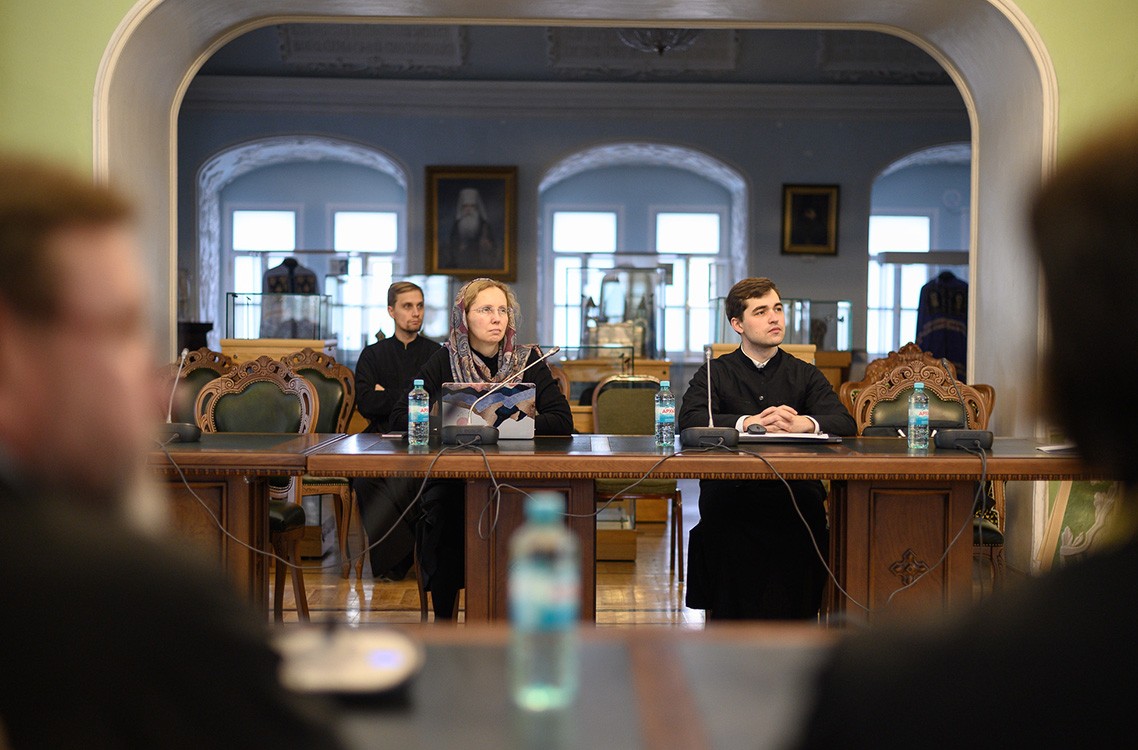
Published materials will be printed in specialized scientific journals of the Moscow Theological Academy.
MThA Press Office
